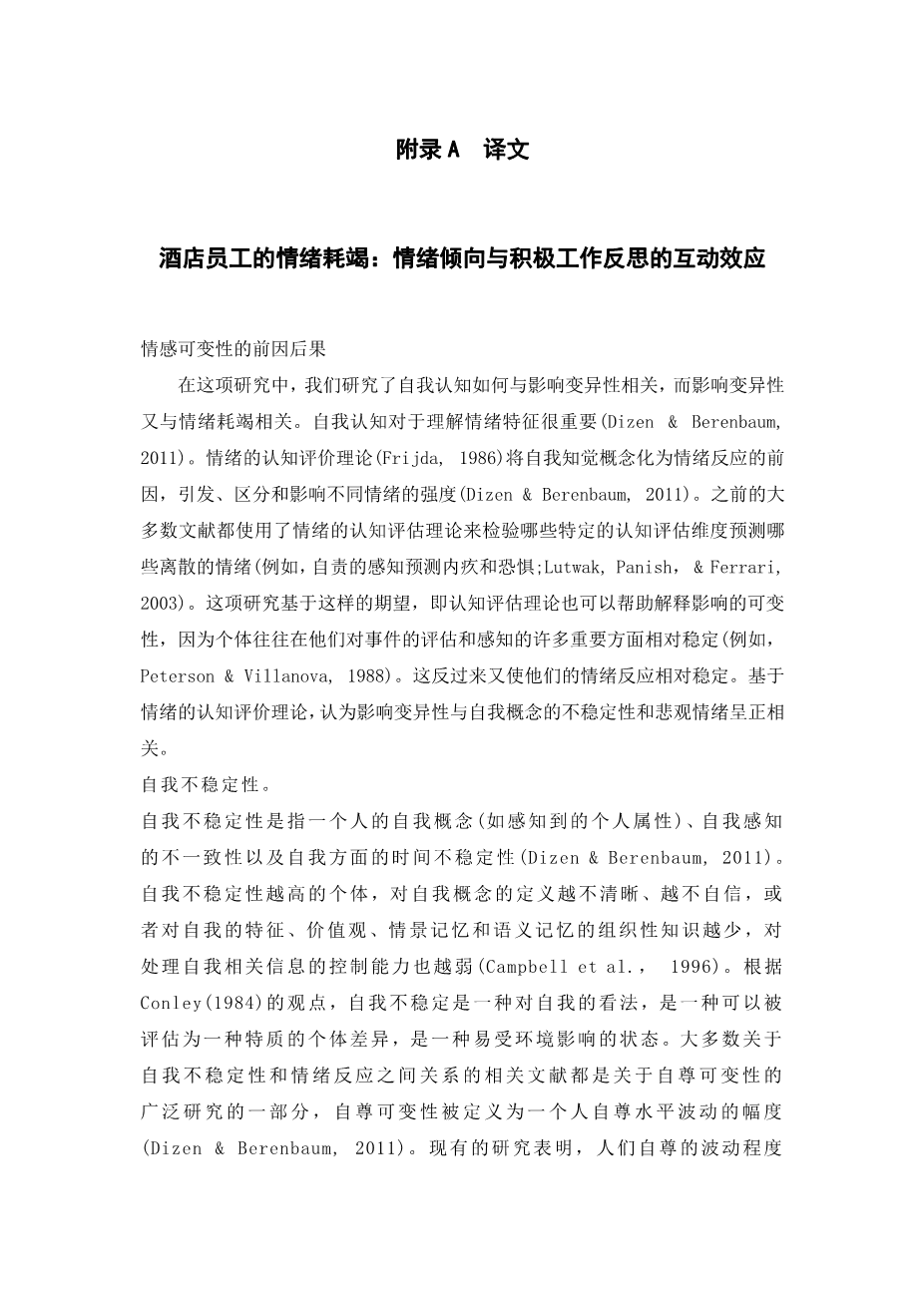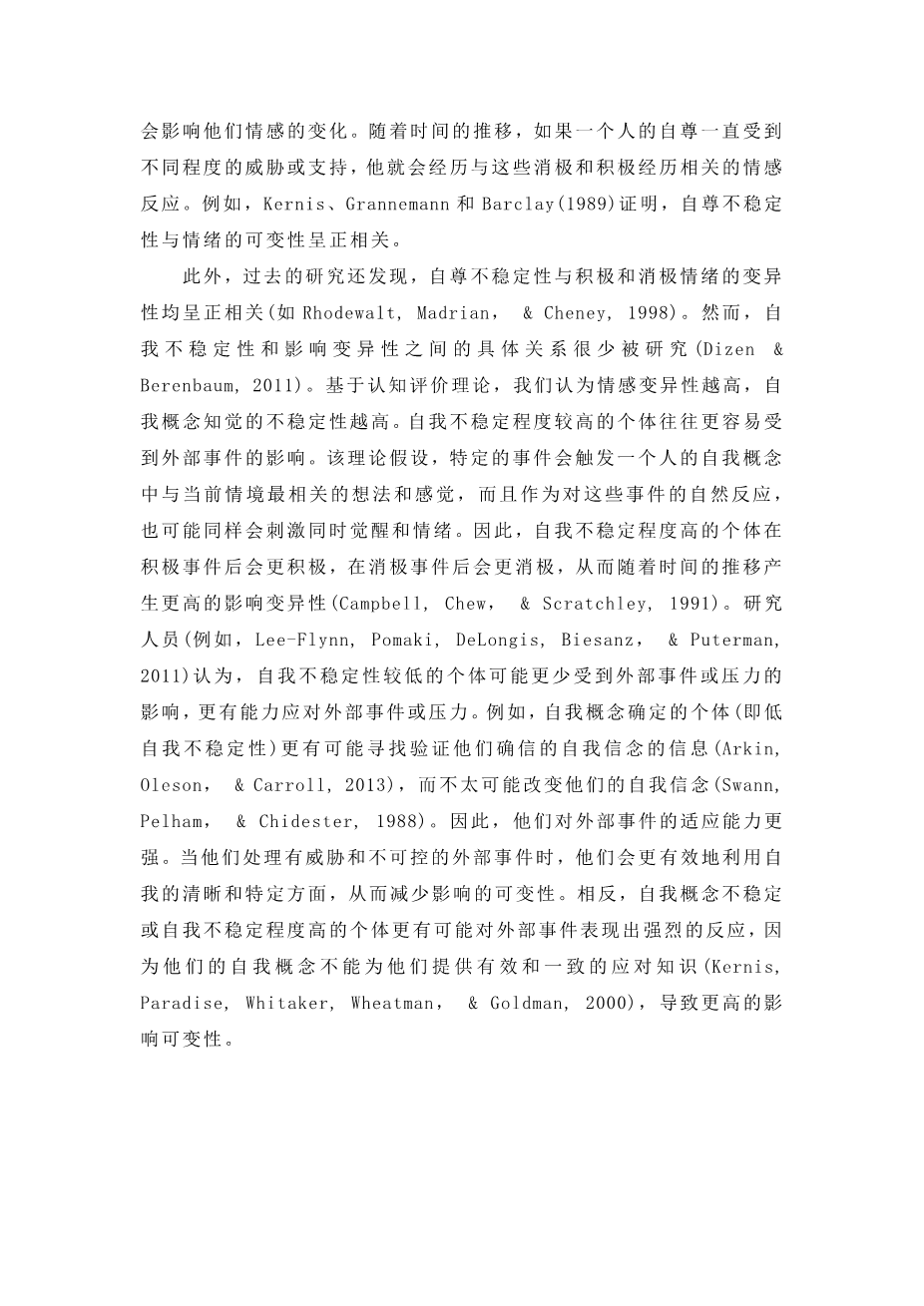Emotional Exhaustion Among Hotel Employees: The Interactive Effects of Affective Dispositions and Positive Work Reflection
Shi Xu, Larry R. Martinez, Hubert Van Hoof, Mateo Estrella Duran, Gabriela Maldonado Perez, and Julio Gavilanes
Abstract
Hospitality employees inevitably face emotional exhaustion when performing their jobs. The purpose of this study was to investigate dispositional antecedents of hospitality employeesrsquo; emotional exhaustion, including self-instability, pessimism, and affect variability, and how employeesrsquo; affect variability mediates the relations between self-instability and pessimism and emotional exhaustion. In addition, we explored the moderating role of positive work reflection on the relation between affect variability and emotional exhaustion. A total of 224 frontline employees in 18 four- and five-star hotels in Ecuador responded to surveys about their emotions and work lives. The findings suggest that (a) emotional exhaustion was influenced by affect variability, (b) affect variability mediated the relations between self-instability and pessimism and emotional exhaustion, and (c) the relation between affect variability and emotional exhaustion was weakened by positive work reflection. The results highlight the importance of potential low-cost and easily trainable interventions that could help in attenuating the negative effects of highly variable emotions and the resulting exhaustion that are prevalent in the hospitality industry. This research is among the first to examine the dispositional antecedents of emotional exhaustion, and the first to highlight the role of positive work reflection as a moderating variable that can buffer the negative effect of affect variability on emotional exhaustion.
Keywords emotional exhaustion; affect variability; self-instability; pessimism; positive work reflection
Conceptual Model and Hypotheses
Affect Variability and Emotional Exhaustion
We anticipated that employeesrsquo; emotional exhaustion would be influenced by affect variability. Affect variability is defined as the frequency, speed, and magnitude of fluctuations in affective states (Oliver amp; Simons, 2004). Some individuals are stable in terms of their affect, whereas others experience fluctuations in their affect that may include extreme emotional states. High degrees of affect variability render individuals vulnerable to the sufferings of everyday life. For example, feeling very happy one moment and very unhappy the next could trigger a physiological stress response, which could alter cortisol profiles (Human et al., 2015) and have negative long-term consequences for both psychological and physical health (e.g., Houben, V an Den
Noortgate, amp; Kuppens, 2015). This could then further translate into emotional exhaustion, job dissatisfaction, and absenteeism,which have been shown to negatively affect customer/employee interactions in service contexts (Grandey, 2000).Emotional exhaustion is characterized by feelings of being overextended, drained, and depleted of onersquo;s resources (Maslach, Schaufeli, amp; Leiter, 2001). According to theory on personal resource depletion (e.g., Hobfoll, 1989), individuals have limited personal resources that allow them to engage in various taxing events throughout a day. Completing a variety of emotional activities—especially in hospitality contexts requiring an effortful regulation of emotions—could be particularly draining because of the depletion of psychological resources (e.g., Shani, Uriely, Reichel, amp; Ginsburg, 2014). Individuals with higher affect variability are more likely to have to engage in affect regulation to fulfill the emotional requirements of the job, relative to those with lower affect variability. Therefore, employees whose affective states are more variable and erratic could experience a higher depletion of their psychological resources at work, in comparison with employees whose affective states are more stable. Excessive consumption of resources is related to unfavorable results, such as lower levels of motivation, task focus, well-being, and psychological health (Hobfoll, 2010), which could ignite a downward spiral of further emotional exhaustion. Given the aforementioned argument, it is expected that affect variability would be positively associated with emotional exhaustion because of emotional resource depletion, and therefore, it is hypothesized as follows:
Hypothesis 1: Affect variability will be positively related to emotional exhaustion.
Antecedents of Affect Variability
In this study, we examine how self-perceptions are related to affect variability, which is in turn associated with emotional exhaustion. Self-perceptions are important to under-stand emotional traits (Dizen amp; Berenbaum, 2011). The cognitive appraisal theory of emotions (Frijda, 1986) conceptualizes self-perceptions as the antecedents to emotional reactions, which elicit, differentiate, and influence the intensity of different emotions (Dizen amp; Berenbaum, 2011). Most of the previous literature has used the cognitive appraisal theory of emotions to examine which specific cognitive appraisal dimensions predict which discrete emotions (e.g., a perception of self-blame predicts guilt and fear; Lutwak, Panish, amp; Ferrari, 2003).This study was based on the expectation that cognitive appraisal theory could also help in explaining affect variability, as individuals tend to be relatively stable in many important aspects of their appraisals and perceptions of events (e.g., Peterson amp; Villanova, 1988), which in turn contributes to their being relatively stable in how they respond emotionally. Based on the cognitive appraisal theory of emotions, it is posited that affect variability will be positively associated with instability of self-concept
剩余内容已隐藏,支付完成后下载完整资料


英语译文共 5 页,剩余内容已隐藏,支付完成后下载完整资料
资料编号:[603905],资料为PDF文档或Word文档,PDF文档可免费转换为Word
以上是毕业论文外文翻译,课题毕业论文、任务书、文献综述、开题报告、程序设计、图纸设计等资料可联系客服协助查找。
您可能感兴趣的文章
- 通过在消费者心中树立品牌关系导向来提高酒店品牌绩效外文翻译资料
- “友好“抱怨行为:走向亲密的手段外文翻译资料
- 服务蓝图:针对关键服务流程的有效方法-在四星级国际酒店Arash Shahin 管理部进行案例研究外文翻译资料
- 组织中女性高管职业生涯规划与晋升的视角:连锁性别偏见的经验,双重束缚,和不成文的晋升规则外文翻译资料
- 影响优秀员工工作满意度的激励因素识别外文翻译资料
- 探索离职意向的影响因素:以豪华酒店员工为例外文翻译资料
- 新冠肺炎疫情下,中国酒店旅游业面临的挑战与机遇外文翻译资料
- 酒店Twitter账号的营销效果:以沙特阿拉伯为例外文翻译资料
- 酒店旅游市场营销外文翻译资料
- 中国经济型酒店SWOT分析外文翻译资料


